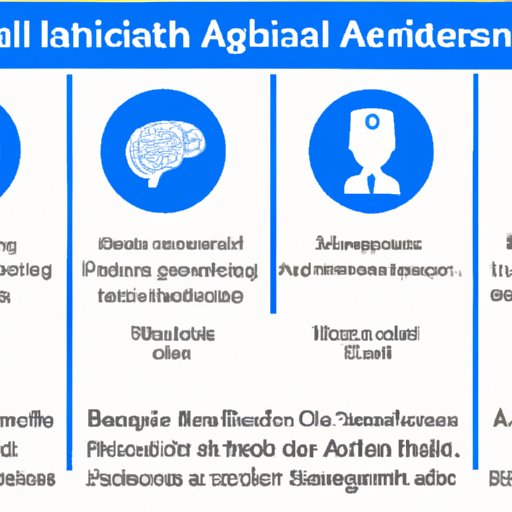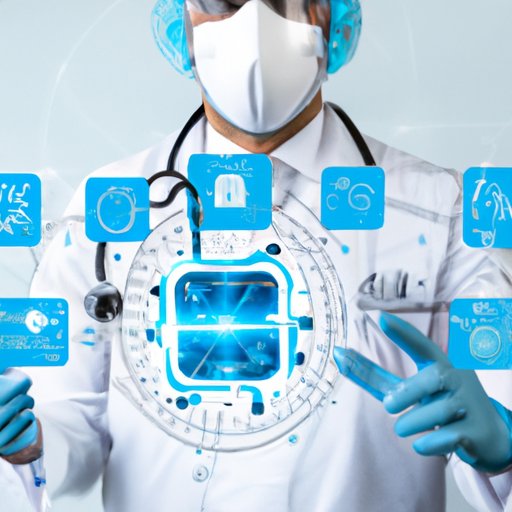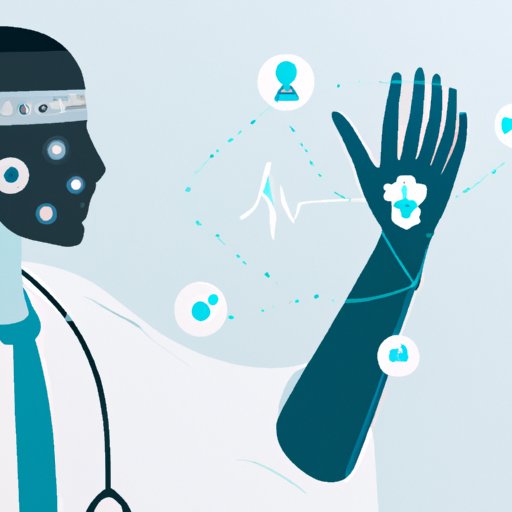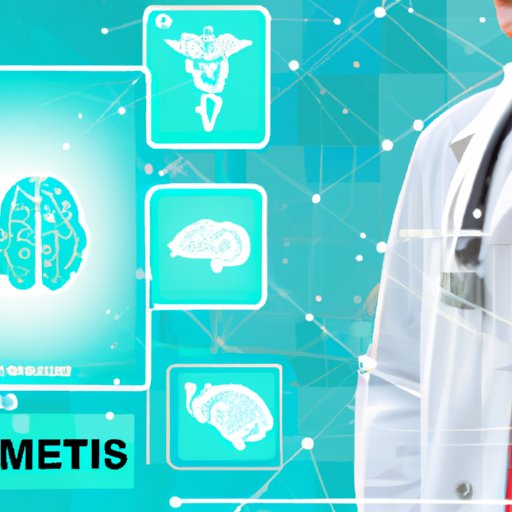Introduction
Artificial intelligence (AI) has become an increasingly important part of healthcare, with its applications ranging from diagnostic accuracy to streamlining treatment plans. AI is a broad term that encompasses many different types of technologies, from machine learning to natural language processing. In this article, we will explore what AI in medicine looks like today and how it can be used to improve patient care.
A Guide to AI in Medicine: What is Artificial Intelligence and How is it Used?
AI is a form of technology that enables machines to learn from data and experiences, without being explicitly programmed. It is used in many aspects of healthcare, from diagnostics and treatment planning to administrative tasks. AI can be used to automate routine processes, improve accuracy and efficiency, and provide real-time insights into patient health. Here are some examples of how AI is being used in medical practice today:
- Diagnostic Imaging: AI can be used to analyze images such as X-rays, MRIs, and CT scans more quickly and accurately than humans, enabling doctors to make faster, more accurate diagnoses.
- Robotic Surgery: Robotic surgery is becoming increasingly common, with robots performing complex surgeries with greater precision and accuracy than human surgeons.
- Predictive Analytics: AI can be used to analyze large amounts of data to identify patterns and trends, which can help physicians make better decisions about patient care.
- Virtual Assistants: AI-powered virtual assistants can be used to assist doctors and nurses with administrative tasks such as scheduling appointments and managing patient records.
Understanding the different types of AI applications is key to understanding the potential of AI in healthcare. There are three main types of AI: supervised learning, unsupervised learning, and reinforcement learning. Supervised learning involves providing machines with labeled data sets so they can learn how to recognize patterns, while unsupervised learning involves giving machines unlabeled data sets so they can discover patterns on their own. Reinforcement learning involves giving machines rewards for correctly completing tasks, so they can learn through trial and error.

Exploring the Potential of AI in Healthcare: Benefits and Challenges
AI has the potential to revolutionize healthcare by improving patient care, enhancing diagnostic accuracy, streamlining treatment plans, and increasing efficiency. Here are some of the potential benefits of AI in healthcare:
Improving Patient Care
AI can be used to provide more personalized care to patients. For example, AI-powered virtual assistants can be used to remind patients to take their medication or book follow-up appointments. AI can also be used to identify patient risk factors and suggest lifestyle changes to prevent diseases before they occur.
Enhancing Diagnostic Accuracy
AI can be used to analyze medical images and detect abnormalities more quickly and accurately than humans. This can lead to earlier diagnosis and improved patient outcomes. AI can also be used to identify patterns in genetic data that can help doctors diagnose and treat diseases more effectively.
Streamlining Treatment Plans
AI can be used to generate patient-specific treatment plans based on a variety of factors, including medical history, symptoms, and test results. This can help doctors develop more effective treatments that are tailored to each patient’s individual needs.
Increasing Efficiency
AI can be used to automate administrative tasks, such as scheduling appointments and managing patient records. This can help reduce paperwork and free up staff time, allowing them to focus on providing better patient care.
Challenges with Implementing AI in Medicine
While there are many potential benefits to using AI in healthcare, there are also challenges. AI systems require a lot of data to work properly, which can be difficult to obtain. Additionally, AI systems can be expensive to implement and maintain. Finally, there is a risk of bias in AI systems if they are not trained properly.
The Role of AI in Transforming Medical Diagnosis and Treatment
AI has the potential to transform the way we practice medicine by enhancing clinical decision making and precision medicine. Here are some of the ways AI can be used to improve patient care:
Enhancing Clinical Decision Making
AI can be used to analyze large amounts of data and provide physicians with real-time insights and recommendations. This can help doctors make more informed decisions about patient care, leading to better outcomes.
Improving Precision Medicine
AI can be used to generate patient-specific treatment plans based on a variety of factors, including medical history, symptoms, and test results. This can help doctors develop more effective treatments that are tailored to each patient’s individual needs.

Advances in AI and Machine Learning to Improve Patient Care
AI and machine learning are transforming the way we practice medicine. Here are some of the advances in AI and machine learning that are helping to improve patient care:
Automated Triage Systems
AI-powered automated triage systems can be used to quickly assess patient symptoms and recommend appropriate levels of care. This can help reduce wait times and improve patient outcomes.
Predictive Analytics for Disease Diagnosis
AI can be used to analyze large amounts of data to identify patterns and trends, which can help physicians make better decisions about patient care. This can lead to earlier diagnosis and improved patient outcomes.
Wearable and Implantable Devices
AI-powered wearable and implantable devices can be used to monitor patients’ vital signs and provide real-time feedback. This can help doctors detect health problems early and provide timely interventions.

How AI is Changing the Way We Practice Medicine
AI is changing the way we practice medicine by automating administrative tasks, improving data accessibility, and enhancing communication and collaboration. Here are some of the ways AI is transforming the healthcare industry:
Automation of Administrative Tasks
AI can be used to automate routine administrative tasks, such as scheduling appointments and managing patient records. This can reduce paperwork and free up staff time, allowing them to focus on providing better patient care.
Improved Data Accessibility
AI can be used to integrate multiple sources of data, such as medical records, imaging scans, and lab results. This can make data more accessible and easier to analyze, leading to improved patient care.
Enhanced Communication and Collaboration
AI can be used to facilitate communication between healthcare providers and patients, enabling more efficient and effective care. AI-powered chatbots can also be used to answer basic questions and provide advice to patients.
Using AI to Enhance Clinical Decision Making and Precision Medicine
AI has the potential to revolutionize the way we practice medicine by enhancing clinical decision making and precision medicine. Here are some of the ways AI can be used to improve patient care:
Generating Patient-Specific Treatment Plans
AI can be used to generate patient-specific treatment plans based on a variety of factors, including medical history, symptoms, and test results. This can help doctors develop more effective treatments that are tailored to each patient’s individual needs.
Integrating Multiple Sources of Data
AI can be used to integrate multiple sources of data, such as medical records, imaging scans, and lab results. This can make data more accessible and easier to analyze, leading to improved patient care.
Leveraging Big Data Analytics
AI can be used to analyze large amounts of data to identify patterns and trends, which can help physicians make better decisions about patient care. This can lead to earlier diagnosis and improved patient outcomes.
Conclusion
AI has the potential to revolutionize healthcare, from improving patient care to enhancing diagnostic accuracy and streamlining treatment plans. While there are many potential benefits to using AI in healthcare, there are also challenges, such as obtaining the necessary data and implementing the technology. As AI continues to evolve and become more advanced, it has the potential to transform the way we practice medicine.
(Note: Is this article not meeting your expectations? Do you have knowledge or insights to share? Unlock new opportunities and expand your reach by joining our authors team. Click Registration to join us and share your expertise with our readers.)
